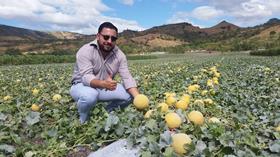
Latin America has long been one of the main sourcing regions for The Greenery and its import division Hagé International. Now the region could be on its way to becoming an important new export market for the Dutch group.
Last year the company carried out the first ever shipment of Dutch-grown Conference pears to Mexico and hopes are high that the country’s 130m consumers could start to acquire a taste for the variety.
“As with all new things, it’s difficult to introduce a brand new product to a new market, but we have high expectations that the programme will grow in the coming years,” says product manager Frank Ocampo, who is more used to dealing with fruit flowing in the opposite direction.
Hagé sources fruits and vegetables from throughout the Americas or, as Ocampo puts it, “from the Carolinas right down to Patagonia”. “Avocados, table grapes, top fruit, citrus, sweet potatoes, pineapples and melons are among the main lines we import – everything except bananas basically,” he says.
“Together with our other overseas programmes and the output from our Dutch cooperative we can supply almost every fruit and vegetable throughout the year to our retail and trade customers in Europe and other markets like the Middle East and Asia.”
Competing in today’s fresh produce is no longer about simply growing and shipping produce. The main goal is to achieve a healthy balance between supply and demand and this can only be done, says Ocampo, when producers and importers act together to make the most of market opportunities as and when they arise.
“The key is in the day-to-day communication between the grower/exporter and importer/distributor to identify the windows where the extra volumes can be supplied, enabling programmes to be extended and ensuring a good return for both parties. This is something that The Greenery values very much in its relationships.”
The Greenery and Hagé have committed to ensuring that by 2020 all of their imported fruit complies with GlobalGAP and at least one social certification scheme such as Sedex/Smeta, Rainforest Alliance, BSCI or Fair trade to name the most common in Latin America.
“It is difficult to convince producers of this worldwide, but fortunately the Latin American producers with whom we work almost all have at least one of these certifications already, and some have two,” Ocampo says.
“The advantage for the producer is that fruit that carries these certifications achieves a better return, while complying with sustainability and environmental standards also benefits farmers and their families, helps the environment and means healthier products for the end consumer.”
This commitment to sustainability is very much in evidence throughout the group: the recently completed extension to the company’s retail distribution centre in Barendrecht, for example, is equipped with almost 10,000 solar panels that generate 15-20 per cent of the energy the company consumes annually.
All of The Greenery’s Dutch production, meanwhile, carries the Planet Proof environmental quality label, which aims to produce fruits and vegetables as sustainably as possible.



